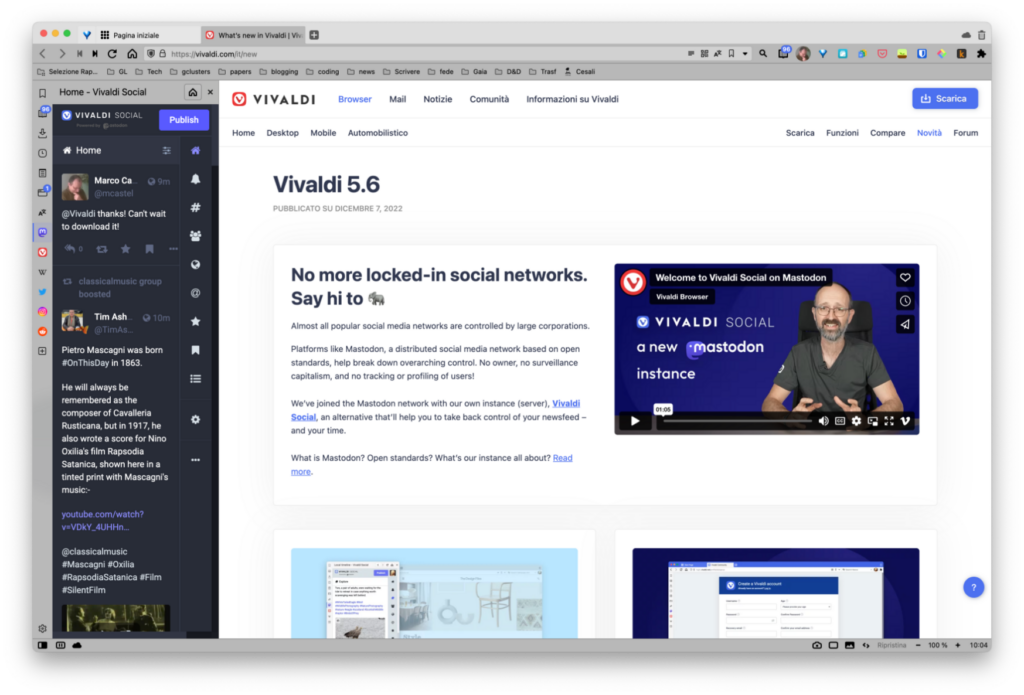One of the most interesting by-products of all the tussle that there was (and still is) following the acquisition of Twitter by Elon Musk , with all the mess also derived from the incongruous moves of the well-known billionaire, is that a lot of people have started, shall we say, to look around .

Yes, trying to figure out if there are viable alternatives to Twitter, for example. Indeed, it would be legitimate to doubt about the fate of a platform ended up in the hands of a person who, in just one day, fired half of the employees (or even more), moved in a random way , resulting in great confusion with the famous authentication blue checks, and finally – gem of the gems, probably – he entrusted an online survey with something as delicate as Donald Trump’s return to Twitter.
Incidentally, on the (slightly) favorable outcome of Donald’s return (who already said thanks but no) Elion hastened to affirm Vox Populi Vox Dei . Too bad, however, that this conclusion – at least in the case of Twitter – is highly questionable, as others have immediately highlighted .
One of the most interesting alternatives to Twitter is undoubtedly Mastodon . To be true, it has already existed for some time, but it has only come under the spotlight now that many people are seriously thinking about moving elsewhere (if instead you were thinking of Jaiku or Quaiku – congratulations, you have a good memory – they are excellent services, yes, but they are also dead).
But here, we need to clarify. Mastodon is not a site . Mastodon is software (open source , by the way). There are many Mastodons around. Or rather, Mastodon instances , to be precise. Everyone can open a server and install Mastodon on it (which can be downloaded for free from the net), creating a community with its specific rules. People then sign up and post messages, conceptually not unlike Twitter.
I made it simple, I know. To tell the truth, there are some differences from Twitter, which also reflect the different philosophical approach, not oriented towards keeping you on the platform: but they go a bit beyond our discussion, so we leave it to everyone to discover them slowly. On the other hand, it is certainly more beautiful to discover them by yourself, while frequenting the environment, rather than having to digest a whole list at a glance, which you don’t even remember.
In any case, after a while you understand that the real strength of Mastodon is not so much the specific conformation of the software – how similar and how different it is from Twitter (which you may like or dislike, depending on your tastes) – but it’s something that underpins the whole thing, which is adherence to the standard called ActivityPub . Personally, this is the thing that fascinated me the most.
In short, ActivityPub is a “social networking protocol” made so that different implementations of a service (and also, different services) can talk to each other. A bit like e-mail: if I’m on Google and you’re on Hotmail we can easily exchange messages, it’s certainly not necessary to have an account on the same platform. Similarly, if I have an account on Mastodon.uno and you are on Sardegna.social (just to mention a couple of Italian instances) we can follow each other and we can interact without any problems. All thanks to this protocol. And the thing also works across different services, as long as they obviously adhere to Activity Pub.
In short, in this scheme one no longer gravitates around a few large “attractors” (the classical Facebook, Instagram, Twitter…) which are inevitably in the hands of the usual very few and very wealthy entrepreneurs. Which, as we know, are naturally structured to maximize profit, that means acquiring your data for commercial purposes and trying to extend the time you spend on the platform itself, in order to serve you more advertising (if you spend this time poisoning yourself with arguments for politics or sports, no big deal: for their purposes anything goes). Conversely, in the fediverse model, you are no longer prey to algorithms that choose what to show you in full view and what to hide, together with the inevitable “purchasing recommendations” based on your browsing history and your interactions.
Each Mastodon instance has its own rules: if you don’t like them, you can migrate somewhere else, make home on another instance. You are not subject to how an Elion gets up in the morning, what he decides to do with blue checks or message moderation. You are undoubtedly more active , more protagonist . Think about it: the very fact of having to choose the instance (or instances) to join implies a reasoning, an analysis. I “reactivated” an account on Mastodon.uno , which I had opened on an experimental basis during the pandemic, but I hadn’t really used it. And I also happily entered social.vivaldi.net, with the credentials I already had as a user of the Vivaldi community, my favorite browser. Two instances, because on Mastodon.uno , people speak mainly in Italian (it is among the rules of this instance), while I would like to test the account on Vivaldi Social to express myself in English. We see. However I reiterate, an account on a single server is sufficient to interact with all users of all “federated” instances. This is the good of it.
In passing, I consider a very good thing that the team in Vivaldi (my favorite browser) is solidly building a community, in which Mastodon now has a very important part. This is the good of Mastodon, the capability to model itself on a specific community, to grow in it, to shape itself in order to respect the natural biodiversity of the net (rather that brutally overwrite it with commercial products of great corporations). As a good surprise, and as a congruent effort in this way, the latest release of Vivaldi browser comes with native Mastodon support.

But we could say, not only Mastodon. The correspondents of many commercial services can be found in the fediverse . Instead of YouTube there is PeerTube , instead of Instagram you find PixelFed , instead of using Reddit you can enter Feddit (here I listed Italian instances, but the reasoning is general) .
Speaking of Feddit, with a friend and colleague we have just opened a space dedicated to astronomy , of course – if you speak Italian like me – you are welcome to take part, even if only to familiarize yourself with this fediverse, if you like. Where precisely (and we really want to prove it) there is room for everything, even for the stars.
Do I sum up? Well, for someone like me, who has seen the birth of the Internet and progressively transform itself from a beautiful and exciting experiment to a proven commercial money-making machine, all this smells like “good old themes”. There is therefore a feeling of nostalgia, I admit it. Once upon a time the Internet was full of attempts and projects, many of which did not last long (as is the order of things), it was however a hotbed of ideas and creativity. There was the marvel of this new tool that moved the desire to do, to try, to imagine. And now, there is again – after a lot of time! – the buzz of something new. Let’s see how it evolves, if this new approach will take on the good taste of a friendly, consolidated reality over time. Hopefully, away from the poisons of Twitter.
So now this fediverse (which can already boast more than six million subscribers , among other things) seems to me a breath of fresh air compared to the unexciting idea of spending one’s existence on the usual sites giving moneys to the usual few person, who already have moneys in great abundance.
Yep, the moneys. And how are these sites financed? Well it’s simple, they are mostly financed with user donations (instances such as Vivaldi Social are slightly different in the sense that they naturally gravitate upon their respective business model). Ethically speaking, after a while that one feels comfortable in an instance, on a platform, perhaps even just a micro-donation through the appropriate sites, can be a good idea. Here too you become an active part, you are not exploited, you decide independently who and how much to finance: if you believe in the goodness of a project and appreciate the dedication of those who work on it, leaving something comes naturally, as a simple act of gratitude.
Here, I like to think that becoming familiar with this fediverse and its decentralized, multipolar model can be a beginning of that movement of awareness that we so much hope for, for which there is much more to discover than the much publicized metaverse, and there is a lot to grow up .
So let’s try to follow this path, with due care but also with a bit of naive boldness if we want, because every road (small or large) that does not wind along familiar and already seen and seen panoramas, could reserve us some nice surprises .
An interesting and informative read 🙂
Thanks a lot! 😉
I think you said all that well. I agree about Vivaldi and how they seem down to earth to just do a good thing and serve the customer. I too have opened a few instances in the past year, after leaving social media for a few years except for MeWe. Unfortunately the other instances are blocking in general so I can not interconnect with Vivaldi, but as you illustrate that might be a good thing.
Before Twitter files were made public people didnt have a real proof of how far the left were able to do for blocking the right: shadowban, block/banned accounts, bans, and a huge etc.
If you consider an alternative from Twitter because it became now really free speech and unblocked accounts of people with points of view different or even opposite of those of the democrats, woke or progresist gropus, well, I must say it is a shame.
Vivaldi is a great browser, the team behind it should keep out of politic points of view and remain neutral.
Totally agree, when some editor of Vivaldi put your political view in the text this push people away. Using Mastodon is a valid alternative for these social media controlled by big companies, but it’s very political say that the Twitter’s problems start with Ellon Musk and Twitter Files is showing that.
Thanks – that’s the clearest explanation of Mastodon I’ve come across so far.
Very informative, thanks. New Year’s Resolution: have a go at this new beast…… Never used Twitter, never saw any point in it. Mastodon seems a bit different though…….
The great thing about Feddit & Lemmy(the software) is that post creation from a Mastodon instance is possible! So really you don’t ever have to leave it if you don’t want to.
Also, fun fact Eugene Rochko one of the developers used to be in charge of an old community forum that I was part of called The Colourless and his goal for that initially was for it to be a federated software
👍👍